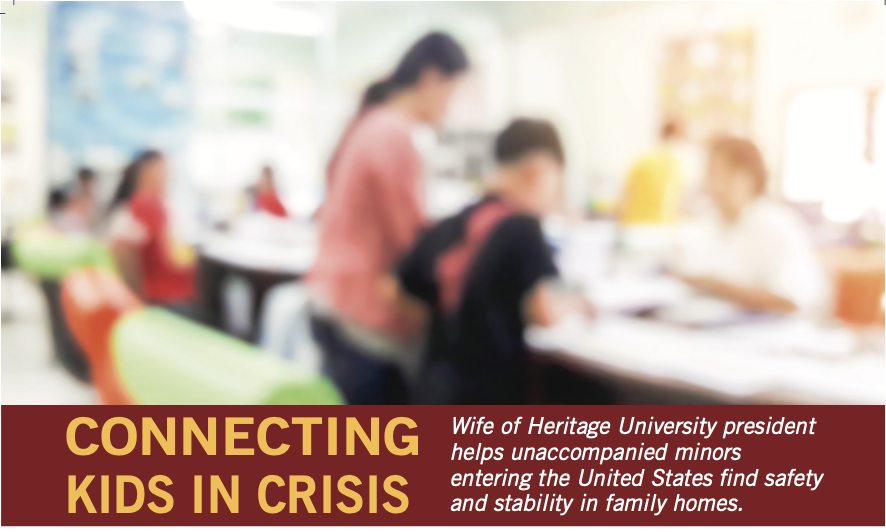Connecting Kids in Crisis
Norma Chaidez, wife of Heritage president Dr. Andrew Sund, remembers coming to the U.S. as a young woman, longing for an education and opportunity. Now she’s making a difference in the lives of children escaping far more desperate situations.
Chaidez serves as the Family Reunification Regional Supervisor with Bethany Christian Services. The organization is a global nonprofit that supports children and families with world-class social services, all designed to help families thrive. Bethany’s work began over 75 years ago with serving a single child. Today, they work in more than 30 states and around the world, impacting tens of thousands of lives every year.
Chaidez is charged to provide home study and post- release services to place minors in home settings in six states – Washington, Illinois, Kansas, North Dakota and Montana. She reunites kids with family or trusted sponsors who can meet their needs and help them thrive. She’s had the opportunity to meet children from Mexico, Guatemala, Honduras, and other countries, like Juan, Pedro and José – whose real names cannot be used for privacy purposes.
ONE CHILD AT A TIME
Juan looks far younger than his years. He was nine years old when he arrived in the United States, but looked about five.
Five-year-old Pedro came to the United States so traumatized by the murder of his father that he stopped speaking.
José was 17. When he refused to sell drugs, the drug dealers punished him by breaking both of his legs.
These are just three of the more than 50,000 people served by Bethany annually. The organization works to find kids around the world who don’t have a permanent home, family-based settings, emergency care and foster care.
CHILDREN FORCED TO THE BORDER
Their journey has been tumultuous, often life-threatening.
Parents in countries like Mexico, Guatemala and Honduras are sometimes so desperate to get their children to a better place that they often send them to the border alone. Some have a little money to get a guide; most do not.
Chaidez says 95% of the children arrive here having experienced some degree of trauma.
“Talking to families, I heard the stories of poverty, violence, organized crime, human and drug trafficking,” she said. “Despite their situations, they’re very resilient.”
Undocumented minors’ experience in this country starts with U.S. Immigration and Customs Enforcement (ICE) officials. They turn the children over to the Office of Refugee Resettlement (ORR), which works with Bethany and a handful of organizations like it whose dedicated staffers get the kids situated with guardians, whether relatives or other sponsors.
“We provide case management services to unaccompanied children who crossed into the United States without legal guardianship and who do not have legal status in this country. Our team conducts home studies of potential sponsors for unaccompanied children and provides support to ease the adjustment process for both the children and their sponsor, “ said Chaidez. “We secure clothing, food or furniture, from community resources or donors. And inspect homes, do follow-up calls, make sure the caregivers have what they need to support the children.
“We start them on their way to a better life.”
UNDERSTANDING THEIR PLIGHT
Though her situation was not so extreme when she came to the U.S. in 1998, Chaidez identifies with her clients’ desperate wish for a better life.
“I came to the U.S. in search of an education and for gender equality. There was no opportunity to go to college in Mexico. But in the U.S., women have more opportunities to go to college, have a voice and rights.”
Language and culture presented a steep learning curve. Chaidez said she wouldn’t have made it if not for the kindness of new friends.
“I was able to rent a family friend’s basement apartment for $175 a month. With my neighbor’s support, I was able to find a job at a local dry cleaner.
“My chosen family motivated me; I was finally able to dream about having a career.”
Because of the support of close friends and her husband, she earned an associate degree from St. Augustine College in
Chicago, then a bachelor’s in psychology, and three master’s degrees– one in forensic psychology from Argosy University in Dallas, one in philosophy from Walden University in Minneapolis, and another in clinical mental health in counseling from Adler University in Chicago. She is currently a Ph.D. candidate in forensic psychology at Walden University.
BEING THERE FOR KIDS
Chaidez remembers her struggles with English, which led her to teach ESL classes to several students every Saturday morning.
One day, Juan looked sad. Chaidez asked him what was wrong. He said he wanted to play with the other kids on the playground, but he didn’t know how to make friends. He didn’t speak English.
“I told him, ‘You just say this, say hi! Do you want to play with me?’ He practiced saying it.”
The next week, Chaidez said, Juan came to his lesson smiling again.
“’They said, ‘Yes, let’s play!’ he said.”
“He was so happy. Now every Saturday I talk with him, he’s always so happy because he has new friends, lives with his parents and attends school.”
“He has what every child needs and deserves.”


